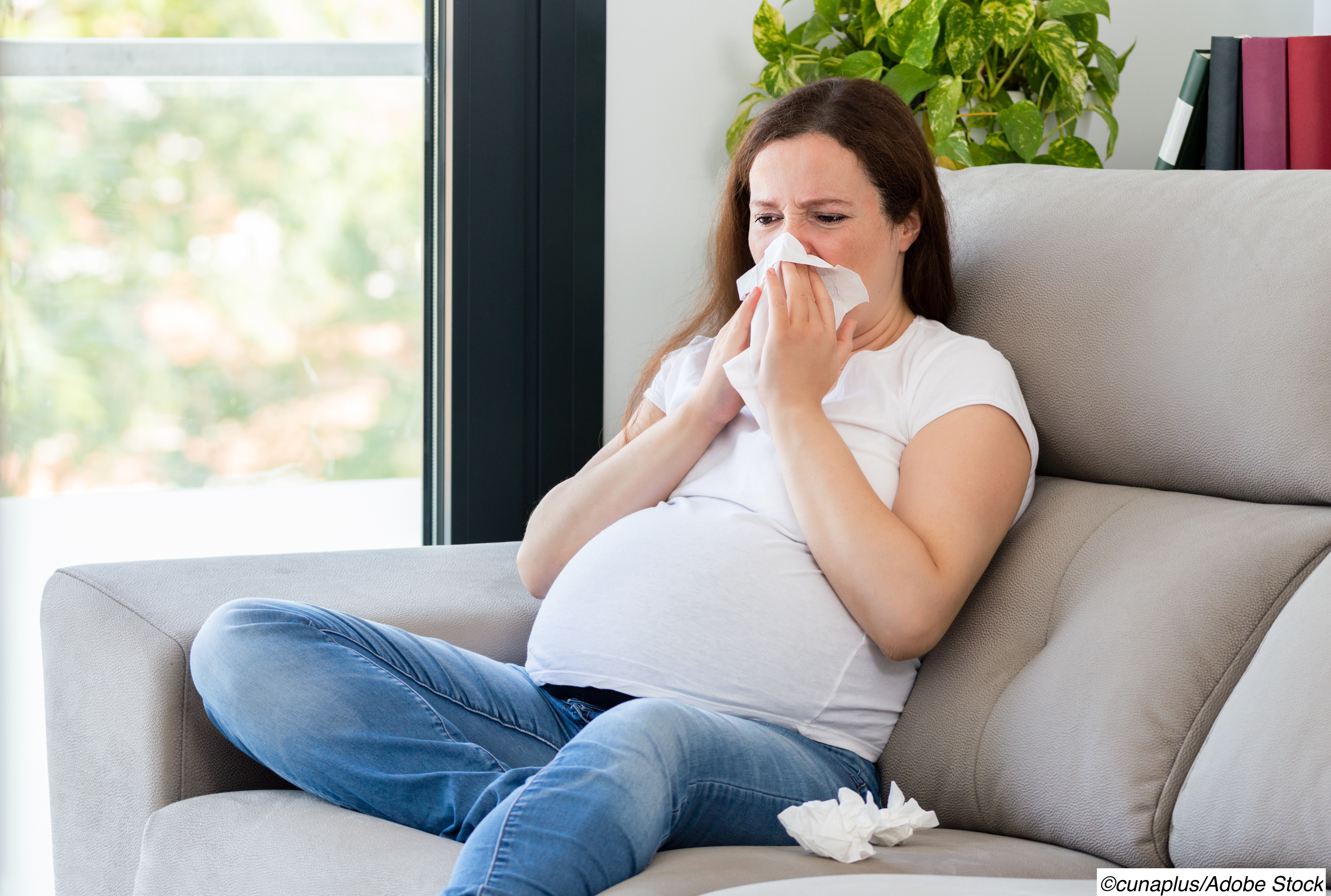Around 30% of women hospitalized with the flu were pregnant, according to analyses of nine U.S influenza seasons, and of these patients, less than a third had gotten the flu vaccine.
In seasons 2010-2011 through 2018-2019, 9,652 women ages 15 to 44 were hospitalized with the flu, and 27.9% were pregnant, according to Rachel A. Holstein, MPH, of the CDC in Atlanta, and co-authors.
Among those patients, 32% were vaccinated against influenza, they wrote in the Annals of Internal Medicine.
Holstein’s group noted that influenza type A was reported in 86.2% (16.4% type A subtype H1N1; 24.1% H3N2), while 13.6% had influenza type B, emphasizing that “[p]regnant women with influenza A H1N1 were more likely to have severe outcomes than those with influenza A H3N2” with an adjusted risk ratio 1.9 (95% CI 1.3-2.8).
These severe outcomes were antiviral treatment in-hospital in 88%, ICU admission in approximately 5%, mechanical ventilation in about 2%, and in-hospital death among 0.3%.
“Considering that approximately 5% of U.S. women of reproductive age are pregnant at any given time, our study contributes to the evidence showing that pregnant women are disproportionately burdened by influenza-associated hospitalization,” they stated.
Furthermore, the “data highlight opportunities to improve influenza vaccine uptake among pregnant women, both through health care provider-initiated recommendations and referrals and through implementation of public health initiatives to increase public trust in the safety and efficacy of influenza vaccination during pregnancy,” the authors said.
That may be easier said than done in what seems to be the age of anti-vaccination. For every health authority cheerleading vaccination during pregnancy—the CDC, the American College of Obstetricians and Gynecologists (ACOG), the Preeclampsia Foundation—there may be as many anti-vaccination campaigns, mostly online and mostly spreading misinformation, noted Robyn Horsager-Boehrer, MD, of UT Southwestern Medical Center in Dallas, in a 2017 post. A more recent report from the Center for Countering Digital Hate (CCDH) and Anti-Vax Watch found that up to 65% of anti-vaccination disinformation was spread by just a dozen individuals and groups.
So, how to get pregnant women in line for flu vaccination? In an editorial accompanying the study, Laura E. Riley, MD, of Weill Cornell School of Medicine in New York City, suggested that the current “findings… [highlight] why pregnant women remain a critical population to focus on for vaccine-preventable diseases, such as influenza and Covid-19,” she observed.
“If we apply the lessons learned from influenza and pregnancy to our current pandemic, all pregnant women must be a focus in our vaccine efforts,” Riley wrote. She called for disseminating data on the safety of the vaccines for mothers and babies, such as a 2020 study that found no significant association between trivalent flu vaccine exposure during pregnancy and six-month infant development. Riley also backed “studies on the efficacy, safety, and dosing of therapeutics in pregnant women,” who are often excluded from clinical trials.
Holstein and co-authors analyzed influenza data from the U.S. Influenza Hospitalization Surveillance Network (FluSurv-NET), a CDC-sponsored network that collects laboratory-confirmed influenza-associated hospitalizations in all age groups. The catchment area includes selected counties in multiple states across the country, and represents about 9% of the total U.S. population.
They conducted a repeated cross-sectional analysis of FluSurv-NET data for each of the nine flu seasons in the study to determine the characteristics of pregnant women hospitalized with influenza, along with an analysis of medical records for the hospitalized pregnancy women, looking at multiple variables, such as demographics, underlying medical conditions, and symptoms at admission.
Among the pregnant cohort, the median age was 28, 62% were in their third trimester, and 42% had at least one underlying condition. The majority of the women (36%) were non-Hispanic white women while 29.2% were Black.
Holstein’s group reported that 71% of the women were still pregnant at hospital discharge. For the women who were not pregnant at discharge, the vast majority (96%) had a live birth, while 3% experienced fetal loss, mostly in the first or second trimester.
As for vaccination, they noted that the “proportion vaccinated was lower among non-Hispanic Black women, women younger than 35 years, and women in their first or second trimester,” and stressed that healthcare provider recommendation and referral have proven to be the most effective way to get pregnant patients on board with the flu vaccine.
Professional societies are doing their part to help practitioners, such as the 2021 launch of the “ACOG Fights Flu” campaign, the CDC/National Foundation for Infectious Diseases 2021-2022 flu vaccine kickoff, and the European Centre for Disease Prevention and Control 2021 flu awareness campaign.
“Women’s health beliefs about vaccination were more important than demographic and maternal factors, including age, race/ethnicity, and education, in influencing decisions about vaccination during pregnancy,” Holstein’s group wrote.
Study limitations included the possibility that some influenza diagnoses may have been missed among pregnant women not tested for influenza; pregnancy and birth outcomes post-discharge are not recorded in FluServ-NET; and the database-driven findings may not be generalizable to all hospitalized pregnant women with the flu in the U.S.
-
About 30% of women of reprodutive age that were hospitalized with influenza were pregnant over nine U.S. influenza seasons.
-
Almost a third of pregnant women hospitalized with the flu were not vaccinated, and those with influenza A H1N1 were more likely to have severe maternal outcomes.
Shalmali Pal, Contributing Writer, BreakingMED™
The study was supported by the CDC/Emerging Infections Program (EIP)/Influenza Hospitalization Surveillance Project.
Holstein reported no relationships relevant to the contents of this paper to disclose. Co-authors reported support from the CDC/EIP.
Riley reported relationships with Turner Publishing, GlaxoSmithKline, UpToDate, MAVEN, the New England Journal of Medicine, Contemporary Ob/Gyn, and ACOG.
Cat ID: 41
Topic ID: 83,41,730,30,41,653,155,924


